Some English guy, Dickies, or Dicksburg, I guess it was Dickens, wrote this book that I read in High School. In high school, most of us were stupefied by the oxymoronic opening line, “It was the best of times, it was the worst of times,…” It is cruel to expect a high school student to appreciate the wisdom contained in the classic phrase. For them, it is simply inane to describe anything as both the best and the worst. Only with lived experience does the inherent ambiguity of life become clear (or perhaps more completely muddled). With time and memory, failures are redefined successes, disappointment becomes hope, and life itself is elusive and mysterious. To gain wisdom is to be humbled. Wisdom is perhaps simply knowing that neither our intention nor expectation determines outcome. For all of our planning, our critical considerations, our need to control all variables, our intentional designs, outcomes are always a surprise. Some might call this Karma, or God, or simply mysterious principles of the universe. It is the worst: an unanticipated outcome for which we now must take responsibility. It is the best: something far beyond our limited design.
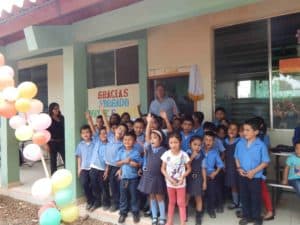
This aura of best and worst engulfed us this past week. Our board president, Attorney Wayne Waite, and the board secretary, Mr. Dwight Armstrong, arrived in Honduras on April 13. They were stretched this way and that in high powered meetings with Honduran government officials, US embassy representatives, university deans, local mayors, humanitarian organizations, Shoulder to Shoulder staff and supporters, and so many others. Draining as it must have been, they did find moments to refresh their spirits. The children at the Good Shepherd Bilingual School greeted them with the exuberance of youth. Dwight, a man of the earth, had the chance to breath in the rejuvenating air of a Camasca farm. Both of them had a moment to relax in our humble home in Concepcion where we listened attentively to their life stories and witnessed their admirable commitment to Shoulder to Shoulder. More meetings and visits followed them on their trek back to Tegucigalpa. Dreams and anxieties, the beauty of mission and the challenge of execution, the satisfaction of achievement and the weight of planning for the future, traveled with them, filling their heads and hearts in preparation for the board meeting.
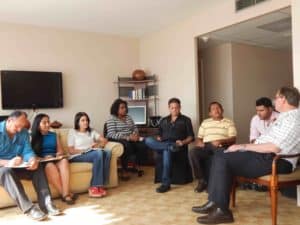
On Saturday morning, the Hombro a Hombro Board (the board for our Honduran NGO) began its deliberations. Laura and I were asked to attend. We believed we would be there for Saturday and leave on Sunday. But we were asked to stay on first until Monday, and then again until Tuesday. We hadn’t brought enough clothes and ended up washing them in the sink. The discussions were inspiring and animated. There are such great opportunities present to Shoulder to Shoulder in its mission of empowerment with the people of Intibucá. Our work in education is bringing hope to children. The potential in agricultural development and food security promises a path to prosperity in the Frontera. Our collaborative work with brigade partners and our expansion in new service areas bring well-being and health to the isolated and forgotten. The value of our present service and these golden opportunities for future service enliven us. But lest our euphoria swell our egos, serious challenges also confront us. Like any charitable organization, our slim and stretched resources threaten our goals. We also see our faults. We could be better organizers. We could be better communicators. Simply, I suppose, we could be better. On top of all this there is the stickiness of working collaboratively. The others, our partners, always have designs different than our own. Why can’t they just recognize that we are right and stop inserting their own thoughts? (It’s a joke)
So we have the best, and so we have the worst: our hearts exploding with joy and our minds crippled with angst. It would be so nice if our deliberations followed a clear and linear path. But rather our deliberations are circular, popping from one theme to the next, always elusive and exhausting. What should be our response? Should we follow our hearts? Should we follow our heads? These questions forever elude any answer.
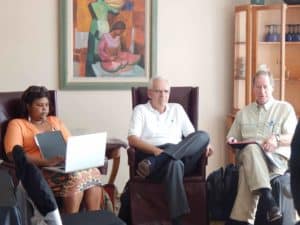
Monday afternoon I’m soaping up and rinsing out my few articles of clothing in the hotel room’s sink, feeling very sorry for myself. I despise doing laundry, even more so when I have to do it by hand which is more often the case than not here in Honduras. The questions weigh on my head and heart. Again feeling sorry for myself, I ask, “Why does it need to be so hard?” The answer I receive humbles me. It is hard because it is important. Ease is not the goal. Purpose, meaning, justice, and connection, these are the goals. These are not easy. I realize that anything in my life that has lasting value is difficult. It is only in recognizing and accepting the challenges, standing in the storm if you will, when dreams are dreamt and missions exercised. This interplay between the best and the worst is how we realize the integrity of service and justice. More mundanely, I feel some shame knowing that most Hondurans wash their clothes by hand without complaint. My petty ego needs to get out of the way.
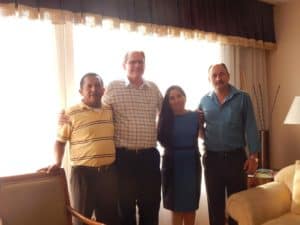
Shoulder to Shoulder is doing incredible things to empower the people of Intibucá. Shoulder to Shoulder will invest in even more meaningful missions, deepening relationships of trust and commitment with the people and associations in Intibucá and Honduras. It is the best of times. None of it happens without facing strong head winds. We will design and plan, consider and decide, and seek out donors and partners to share our mission shoulder to shoulder. This, as necessary as it is, will not yield success. It is not the keenness of our minds, nor the professional quality of our planning, nor the wealth of our endowment, that secures the rightness of our mission. It is the integrity of the heart. If we maintain the integrity of our hearts, our dreams will wake. The results will not appear as we had envisioned. They will be so much better than the limits of our minds. They will flood our hearts with joy.
Indeed, these are the best of times, these are the worst of times… And the story continues…
Secret Mission
Attorney Wayne E. Waite, President of the Shoulder to Shoulder Board, and Dwight Armstrong, Secretary for the Shoulder to Shoulder Board and CEO of Future Farmers of America (FFA), bopped around the Frontera this week with a maddening schedule. Everyone wants to get the ear of the boss. With only few days until the StoS board meeting in Tegucigalpa, important issues demand attention. Laura and I met up with them in Camasca at the Good Shepherd School. We had never met Wayne nor Dwight. First impressions are so very important; for the third time since I’ve been in Honduras, I donned a button-down, collared shirt.
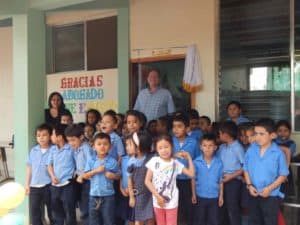 The children hosted a festive celebration and a classroom was named in Wayne’s honor. Pomp and circumstance to serious deliberations, critical, tense meetings dominated the afternoon. Still, Wayne had time for the contractor working on the newly begun construction of a second school building. Standing on planks suspended over the foundation, I translated and learned how this man had built most of StoS’s clinics, starting with our first at Santa Lucia. For all the attention being given to Wayne, how important was it to honor this man’s humble contribution; a builder who knows the import of strong foundations. Meetings piled onto meetings without any breathing space. Sometime mid-morning, Wayne and Dwight ran down to the mayor’s office to attend a presentation by the local contingent of the FAO (Food and Agricultural Organization of the United Nations).
The children hosted a festive celebration and a classroom was named in Wayne’s honor. Pomp and circumstance to serious deliberations, critical, tense meetings dominated the afternoon. Still, Wayne had time for the contractor working on the newly begun construction of a second school building. Standing on planks suspended over the foundation, I translated and learned how this man had built most of StoS’s clinics, starting with our first at Santa Lucia. For all the attention being given to Wayne, how important was it to honor this man’s humble contribution; a builder who knows the import of strong foundations. Meetings piled onto meetings without any breathing space. Sometime mid-morning, Wayne and Dwight ran down to the mayor’s office to attend a presentation by the local contingent of the FAO (Food and Agricultural Organization of the United Nations).
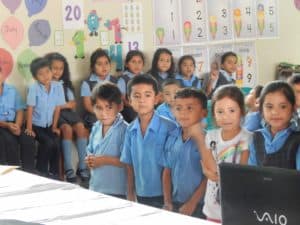 Dwight has dedicated his life to agriculture, particularly the education and inclusion of youth in health and nutrition and the sustainable management of our earth’s produce. Shoulder to Shoulder is taking interest in agriculture and food security in the Frontera. Almost everyone farms on the Frontera. It is about the only thing here that resembles what might be considered a job. Mostly it’s subsistence farming. FAO’s presentation was about moving people beyond that; where education and sustainable structures empower people with production and pride. It was an impressive presentation; a well-thought out, well-designed, systematic response with real opportunity for change. StoS clearly could partner with such a program and mission. Food security is another means to assist the journey from poverty to dignity. Dwight was impressed and enthused.
Dwight has dedicated his life to agriculture, particularly the education and inclusion of youth in health and nutrition and the sustainable management of our earth’s produce. Shoulder to Shoulder is taking interest in agriculture and food security in the Frontera. Almost everyone farms on the Frontera. It is about the only thing here that resembles what might be considered a job. Mostly it’s subsistence farming. FAO’s presentation was about moving people beyond that; where education and sustainable structures empower people with production and pride. It was an impressive presentation; a well-thought out, well-designed, systematic response with real opportunity for change. StoS clearly could partner with such a program and mission. Food security is another means to assist the journey from poverty to dignity. Dwight was impressed and enthused.
Good systems and good mission colored the day’s theme. Wayne is the responsible party for those good systems built around good missions. Still, it can be so draining because the demands are very high, there is always a greater need. Expand the mission, build another system. It all looks perfect on paper, but spits, sputters, and whines in operation. But lasting meaningful change demands close attention to the soundness of the mission and the effectiveness of the systems. By late Wednesday afternoon, Attorney Waite and Mr. Armstrong were deep into the forest of what is Shoulder to Shoulder. But what about the trees?
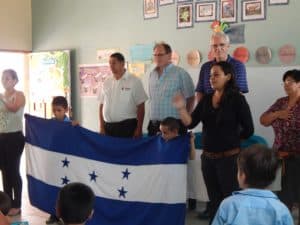 Laura and I were anxious to get back to Concepción. It was late, and if we were to walk, we hoped to avoid nightfall. Wayne overheard us and declared that he was going to Concepcion and would take us. This surprised everyone. It wasn’t on the schedule, he hadn’t eaten yet, and he would likely return late. He insisted that he was going, graciously offering us a ride, but secretive as to the purpose of his trip. Being the boss, he gets what he wants.
Laura and I were anxious to get back to Concepción. It was late, and if we were to walk, we hoped to avoid nightfall. Wayne overheard us and declared that he was going to Concepcion and would take us. This surprised everyone. It wasn’t on the schedule, he hadn’t eaten yet, and he would likely return late. He insisted that he was going, graciously offering us a ride, but secretive as to the purpose of his trip. Being the boss, he gets what he wants.
Half way down the mountain, Wayne asks if we wouldn’t mind accompanying him on a short side-trip to Guachipilincito. There is no such thing as a short side-trip in the Frontera, and we were aware it would be more than an hour out of the way. But clearly this was the revelation of Wayne’s secret mission. Our curiosity won out over our tiredness and we agreed to accompany Wayne and Dwight to Guachipilincito. After the onerous, jolting ride down the rocky, single lane road, we sit in our car in the center of town. It’s dark and no one’s out. After a cell phone call, the town nurse arrives. She gets in our car and directs us a short distance to a house. In the small house, sparse furnishing greets us: one, maybe two, straight-backed chairs, a variety of hand tools hanging here and there, and a unfinished, wooden table. Hammocks suspend from the ceiling substituting for beds. Another room or two might lurk behind curtained doors, but there is little more space. The nurse, who the family knows, and five American strangers enter the woman’s home. She welcomes us (as if this were an everyday occurrence); the cultural demand of hospitality not allowing anything but graciousness. The matriarch, probably in her late thirties or early forties appearing to be in her sixties, stands above her eldest daughter. The daughter holds her tiny baby; a newborn, anyone would surmise. Two other younger brothers stare at us; the older of whom is clearly mentally challenged. The rawness of poverty breathes here. Wayne bends down to the baby, and, through the translator, the child’s grandmother converses, answering questions meant for the mother. The child is ten months old and weighs eleven pounds. His mother is fifteen. One month ago, the baby only weighed six pounds so they are encouraged that the baby is finally retaining some nutrition and weight. Wayne gives the grandmother a plastic bag that includes two cans of baby formula.
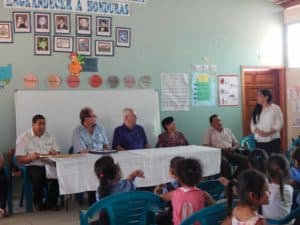 In the car, the nurse discloses that the father is twenty-five, not at all present, and initially denied he was the father. He has done nothing to support the child or the fifteen year old mother. After much fighting, finally he agreed to give the family about seventeen dollars a month. StoS assisted the family through the difficult pregnancy and birth, monitored the progress of the child, and has provided the medical care and nutritional supplements. There was no particular need for Wayne to buy or deliver the formula. Still, this was Wayne’s secret mission.
In the car, the nurse discloses that the father is twenty-five, not at all present, and initially denied he was the father. He has done nothing to support the child or the fifteen year old mother. After much fighting, finally he agreed to give the family about seventeen dollars a month. StoS assisted the family through the difficult pregnancy and birth, monitored the progress of the child, and has provided the medical care and nutritional supplements. There was no particular need for Wayne to buy or deliver the formula. Still, this was Wayne’s secret mission.
Missions need to be developed, structures and systems designed and implemented, accords signed, clinics and schools built, education provided, complaints addressed, relationships forged, people served, and a thousand other things attended to. In Shoulder to Shoulder’s next mission, we will do our best to partner with Honduran farmers, local governments, and other well-intentioned agencies to establish food security in the Frontera. But a sound mission and an effective system is not enough to satisfy the hunger of the heart.
Youth the World Over
March24,2015
Coming to Honduras for the first time, many things might make you feel uneasy because they are different from the environment your body and brain are accustomed to. But the consciousness of that, just what is different and why it makes you uneasy, lags behind the feeling itself. There are biological reasons for that, but suffice it to say it takes a little time for you to figure out what’s different here. One thing you’ll figure out rather quickly, however, especially if you’re over 30 years old, is that there is a superabundance of young people. Anywhere you go in public, they just seem to swarm about you. It’s pretty easy for your conscious brain to figure that out. The median age of the population here is 20.7 years and the life expectancy 74. In the US, the median age is 36.9 and the life expectancy 79.8. That’s a huge difference. Public and social life is dramatically different here because of it.
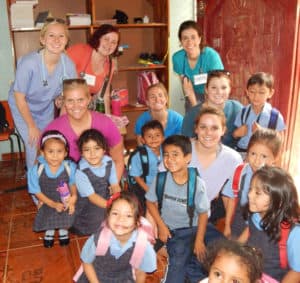
Life for adolescents and young adults is much more structured in the US than here. In the US, almost everyone is in school until at least 18 years of age, and a significant proportion continue with higher education. In Honduras, 60% have finished their education by the sixth grade, much fewer attend or graduate high school, and in realty almost no one goes on to higher education. In the US, young people who are not in school are generally in the work force. In Honduras, those who are in the work force are generally pretty young, but work itself is pretty scarce. Besides these two most obvious and striking differences for the socialization and personal development of youth, the countless supports for adolescents and young adults in the US are rare to non-existent here. Here, families and culture are the principle, if not the only, supports for adolescent development. Some families provide this support superbly. But many families are simply too challenged. Mothers are too young, fathers are too distant or not present at all, financial hardships are too demanding, and older siblings take on parenting roles too young. There are already too many young people, their numbers expand exponentially, and all the while the structures and supports to be a healthy, happy young person are shrinking.
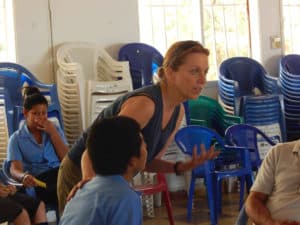
Dr. Martha Kubik and the student nursing brigade from the University of Minnesota have been in Southern Intibucá this past week. Their focus, a much needed focus, is adolescent youth. Laura and I met up with them in Camasca at the High School. We were with them in the auditorium where they were seeing fifteen to twenty year olds. Dr. Kubik was very busy organizing the event, but she had a few minutes to speak with me. With a beaming smile she said to me, “Look at these kids, aren’t they wonderful. They’re just like kids in the US.” I have to admit her statement initially threw me. The difference in experience for kids in Honduras and kids in the US is stark. Honduran kids face challenges that, quite frankly in my opinion, no kid should face. But, I had the opportunity to observe the kids gathered in the auditorium and reflect on what she said. First I recognized that what she said was absolutely correct. Second, I realized that she fully appreciates the challenges for Honduran youth and was responding to them justly and with compassion.
There is a universal experience to what it means to be an adolescent. There is a biological component and its consequent expression in socialization. I watched how the kids touched one another, testing and experimenting. I watched their vivid, almost exaggerated, expressions; moved deeply it seems by life’s fullness and its affect on them. They smile widely at one another, but alone, unwatched, deep sadness can cast shadows over that brilliance. Boys tease girls almost ceaselessly. Girls feign annoyance, glaring at them disapprovingly, then turn to their girl friends with knowing pride. They are insatiably curious. All of them questioned the cards they were given by brigade members. Two simple English words, “vitals” and “screening,” were written on the cards indicating the two procedures they were to have. All of them wanted to know what the words meant. The brave ones called me or one of the interpreters over to translate. A very industrious, young man left the auditorium and returned with an English-Spanish dictionary. Unfortunately, it didn’t help. Challenge and discovery, fear and joy, love and rejection intensely fill their days. The world, their futures, are yet unexplored; terrifying demands and limitless opportunities. Whereas if I studied them carefully I could note the subtle cultural and environmental influences on their behavior, this would dishonor the primary influence of their journey. They are discovering who they are and how to be one with another.
 Dr. Kubik and the University of Minnesota, after extensive research and focus groups here in Honduras, have designed an interviewing tool to use among adolescent, Honduran youth. First they are weighed, measured for height, and have their blood pressure checked. Then they sit down individually, one on one, to dialogue over a few key themes of how to be a young person. Two of the brigade members were Spanish-speaking, and three were assisted by translators. The interview speaks to nutrition, exercise, sports, socialization, relaxation, and a variety of youth health themes. It also touches upon mental health, sexuality, and drug use. The content is excellent. There is no demand that the young person converse. Some might. Most don’t. But they know that many of the things they’ve been feeling are not a mystery. It’s the normal process of life and socialization. If something is discovered in the process that gives concern for the well-being or the health of the young person, a referral is made.
Dr. Kubik and the University of Minnesota, after extensive research and focus groups here in Honduras, have designed an interviewing tool to use among adolescent, Honduran youth. First they are weighed, measured for height, and have their blood pressure checked. Then they sit down individually, one on one, to dialogue over a few key themes of how to be a young person. Two of the brigade members were Spanish-speaking, and three were assisted by translators. The interview speaks to nutrition, exercise, sports, socialization, relaxation, and a variety of youth health themes. It also touches upon mental health, sexuality, and drug use. The content is excellent. There is no demand that the young person converse. Some might. Most don’t. But they know that many of the things they’ve been feeling are not a mystery. It’s the normal process of life and socialization. If something is discovered in the process that gives concern for the well-being or the health of the young person, a referral is made.
When the interviews were over, I watched the brigade members coming back together with the group. They all displayed a satisfied, even joyful, expression. I asked each of them how it went. They all thought it was meaningful. They all seemed to gain a sense of fulfillment. I imagined that for many of these kids this might be the only time someone has explained some of what they are feeling. How essentially important that is! When we honor someone else’s experience, when we can reflect our common humanity, we are sharing a precious gift. Though there is so much more the kids in Honduras need, without this gift of honoring, we would simply miss the real point of it all.
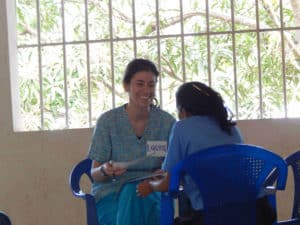 Thank you Dr. Kubik and all of the Minnesota nursing students for honoring the youth of Honduras.
Thank you Dr. Kubik and all of the Minnesota nursing students for honoring the youth of Honduras.


